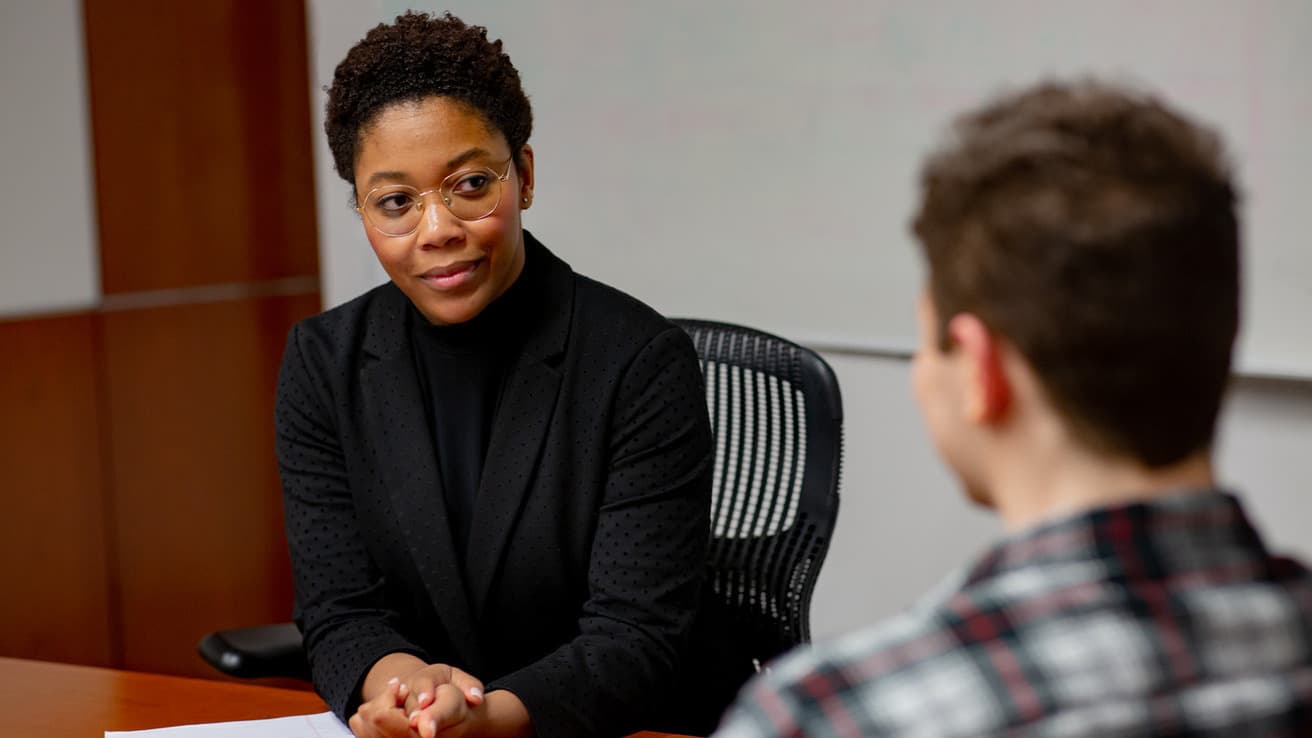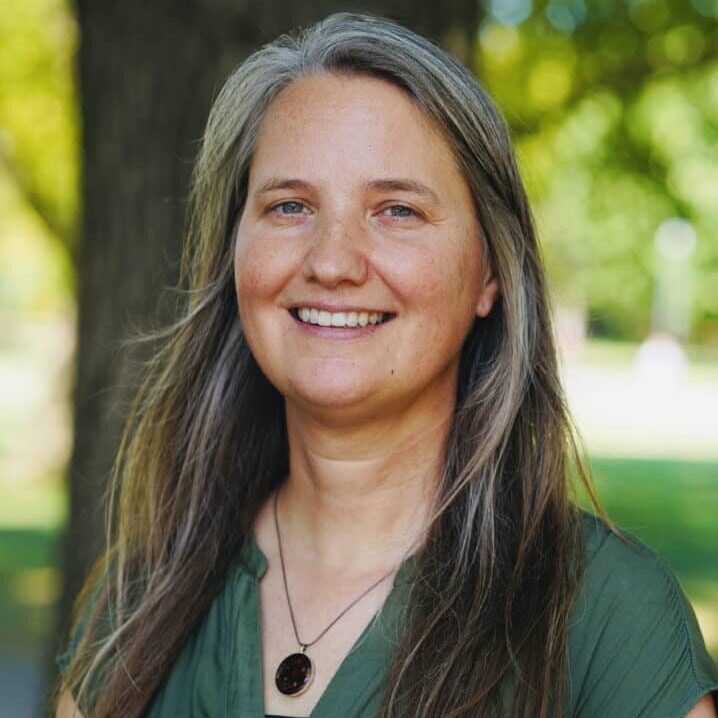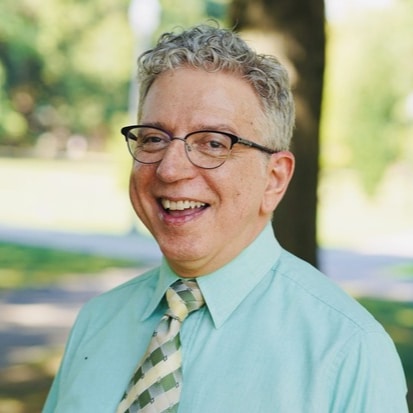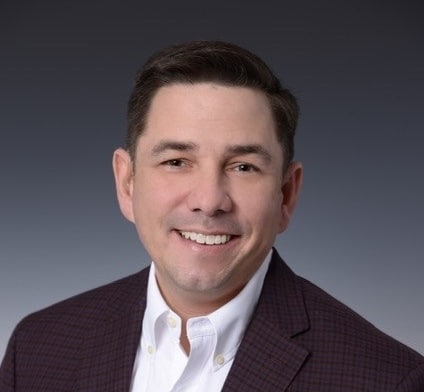Master of Social Work

March 26, 2026
May 11, 2026
Be the change you want to see in the world
The online MSW program offers two pathways to the master’s degree. In both Master of Social Work options, you can attend part-time or full-time, and no GRE is required. All courses are asynchronous, which means you can take online courses on your own schedule, and many courses offer live sessions that provide opportunities to engage in real time with faculty and other students.
If you have earned a Bachelor of Social Work (BSW or BSSW) in the last 5 years with a 3.0 undergraduate GPA and a “B” or better in all required social work courses, you are eligible for the Advanced Standing Master of Social Work program, which provides an accelerated path to your degree. The Advanced Standing MSW program typically takes 3 semesters (1 year, including summer semester) to complete for full-time students and 6 semesters (2 years, including summer semester) for part-time students.
Frequently Asked Questions
This program can be completed 100% online with no campus visits required. Field placement will be completed with an agency within a student’s local area.
Online courses at Ohio State are different from on-campus courses. We have designed online courses to take advantage of the benefits of the virtual experience, including connecting to outside people and ideas, presenting information, and engaging in discussions with your classmates and faculty.
The cost of instruction will vary depending on which degree or certificate you are seeking as well as if you are going full or part-time. Please refer to our tuition table or tuition calculator to more fully understand our tuition costs.
Any current or prospective students interested in completing the online MSW program while abroad should be aware of the processes and potential challenges that occur when seeking an education abroad. When applying to the MSW program, please reach out to cswadmissions@osu.edu to schedule a meeting with a member of the College of Social Work to discuss your specific plans. We will work with you to determine if earning your MSW internationally is possible.
Recognition & Accreditation

CSWE Accreditation
The Council on Social Work Education’s Board of Accreditation is recognized by the Council for Higher Education Accreditation as the sole accrediting agency for social work education in the United States and its territories.

National Recognition
Ohio State’s Master of Social Work is ranked the #12 Social Work School by U.S. News & World Report (2024).
Related Content
Related Content

How Do I Become a Social Worker?
Learn how to become a social worker and discover the social worker degree requirements at Ohio State.

What Can You Do With a Master’s in Social Work?
Discover what you can do with a Master of Social Work, including different types of social worker careers you can explore with Ohio State’s online MSW.

How Much Does Online College Cost?
Calculate the cost of an online degree, and discover the best online degree for you and your budget.
Academic Calendar
For your convenience, multiple start dates are offered during the academic calendar year for the Master of Social Work program. Social Work has a long and rich tradition at Ohio State; we offered our first social work course in 1875 and awarded our first Master’s degree in 1923. Accredited in 1919, Ohio State is the country’s oldest continuously accredited social work program in a public university.
More than 9,000 alumni serve as leaders and change agents across the United States working as direct practitioners, administrators, evaluators, and analysts in a wide range of public, private, and government agencies.
Academic Calendar
For your convenience, multiple start dates are offered during the academic calendar year for the Master of Social Work program. Social Work has a long and rich tradition at Ohio State; we offered our first social work course in 1875 and awarded our first Master’s degree in 1923. Accredited in 1919, Ohio State is the country’s oldest continuously accredited social work program in a public university.
More than 9,000 alumni serve as leaders and change agents across the United States working as direct practitioners, administrators, evaluators, and analysts in a wide range of public, private, and government agencies.
Admission Criteria
- Any baccalaureate degree from an accredited college or university.
- Grade-point average (GPA) of 3.0 or higher (based on a 4.0 system) for last highest degree earned is preferred. Applicants who do not meet the 3.0 GPA will be reviewed for admission on a case-by-case basis.
- At least 15 quarter or 10 semester credit hours of coursework in the social sciences (examples of approved subjects are typically: Anthropology, Communications, Criminology, Economics, Geography, Globalization Studies, International Studies, Political Science, Psychology, Sociology, Speech and Hearing Science, and World Politics). If you believe you have taken a social science course, but it is not directly from one of the departments listed, a course syllabus will be needed for review.
- Bachelor of Social Work within the last five years from an accredited college or university by the Council on Social Work Education.
- “B” or better in all social work required courses (a “B-” does not meet eligibility requirements).
- Cumulative grade-point average (GPA) of 3.0 or higher (based on a 4.0 system) for the Bachelor of Social Work degree.
- Successful completion of field evaluation/learning agreement from their undergraduate program.
- At least 15 quarter hours or 10 semester hours of coursework in the social sciences (examples of approved subjects are typically: Anthropology, Communications, Criminology, Economics, Geography, Globalization Studies, International Studies, Political Science, Psychology, Sociology, Speech and Hearing Science, and World Politics). If you believe you have taken a social science course, but it is not directly from one of the departments listed, a course syllabus will be needed for review.

The Ohio State University participates in the State Authorization Reciprocity Agreements (SARA).
SARA is a national initiative that increases student access to distance education courses and programs while maintaining compliance with state regulations. Institutions participating in SARA can offer educational opportunities in all 49 SARA member states, the District of Columbia, the U.S. Virgin Islands and Puerto Rico without seeking individual approval in each state.
California is not a SARA member state, however, OSU may offer online courses and programs to students located in California under the California Private Post-Secondary Act of 2009.
The Application Process
Once you understand your program’s admission criteria, please note the application deadline. You’ll need a quiet space and a variety of materials for your application. To learn more, please see our Admissions page for the full process. Ready to Apply? Find your application here.
Career Outlook
According to the U.S. Bureau of Labor Statistics, overall employment of social workers is projected to grow 6 percent from 2024 to 2034, faster than the average for all occupations. One of the reasons for this growth? Social workers are everywhere. If you complete our online Master of Social Work program, you will be able to serve your community in a variety of industries and workplace settings, including but not limited to:
- Schools
- Hospitals
- Courts
- Correctional facilities
- Mental health and addiction centers
- Foster care and adoption agencies
- International aid organizations
- Military bases
- Private practice
- Community centers
- Child welfare agencies
- Nursing homes and adult day centers
- Policy
Completion of the online master in social work will prepare you to sit for your social work licensure exam, subject to state educational requirements for licensure and certification.
Top Occupations by Median Income
What They Do
Plan, direct, or coordinate the activities of a social service program or community outreach organization. Oversee the program or organization's budget and policies regarding participant involvement, program requirements, and benefits. Work may involve directing social workers, counselors, or probation officers.
Work Activities
Establish and oversee administrative procedures to meet objectives set by boards of directors or senior management. Direct activities of professional and technical staff members and volunteers. Evaluate the work of staff and volunteers to ensure that programs are of appropriate quality and that resources are used effectively.
Wage Range
- Entry Level: $50,020
- Mid Level: $78,240
- Senior Level: $129,820
Job Outlook
Bright
Projected Growth
8.2%
Related Careers
- Child, Family, and School Social Workers
- Community Health Workers
- Education and Childcare Administrators, Preschool and Daycare
- Healthcare Social Workers
- Rehabilitation Counselors
Job Sectors
- Customer and Personal Service
- Administration and Management
- English Language
- Psychology
- Education and Training
What They Do
Counsel individuals to maximize the independence and employability of persons coping with personal, social, and vocational difficulties that result from birth defects, illness, disease, accidents, aging, or the stress of daily life. Coordinate activities for residents of care and treatment facilities. Assess client needs and design and implement rehabilitation programs that may include personal and vocational counseling, training, and job placement.
Work Activities
Prepare and maintain records and case files, including documentation, such as clients' personal and eligibility information, services provided, narratives of client contacts, or relevant correspondence. Confer with clients to discuss their options and goals so that rehabilitation programs and plans for accessing needed services can be developed. Develop rehabilitation plans that fit clients' aptitudes, education levels, physical abilities, and career goals.
Wage Range
- Entry Level: $34,480
- Mid Level: $46,110
- Senior Level: $77,200
Job Outlook
Below Average
Projected Growth
1.8%
Related Careers
- Child, Family, and School Social Workers
- Healthcare Social Workers
- Mental Health and Substance Abuse Social Workers
- Mental Health Counselors
- Occupational Therapy Aides
Job Sectors
- Customer and Personal Service
- Therapy and Counseling
- Education and Training
- Psychology
- English Language
What They Do
Counsel and advise individuals and groups to promote optimum mental and emotional health, with an emphasis on prevention. May help individuals deal with a broad range of mental health issues, such as those associated with addictions and substance abuse; family, parenting, and marital problems; stress management; self-esteem; or aging.
Work Activities
Maintain confidentiality of records relating to clients' treatment. Encourage clients to express their feelings and discuss what is happening in their lives, helping them to develop insight into themselves or their relationships. Assess patients for risk of suicide attempts.
Wage Range
- Entry Level: $39,090
- Mid Level: $59,190
- Senior Level: $98,210
Job Outlook
Bright
Related Careers
- Clinical and Counseling Psychologists
- Healthcare Social Workers
- Marriage and Family Therapists
- Mental Health and Substance Abuse Social Workers
- Rehabilitation Counselors
Job Sectors
- Psychology
- Therapy and Counseling
- Customer and Personal Service
- English Language
- Education and Training
What They Do
Assist other social and human service providers in providing client services in a wide variety of fields, such as psychology, rehabilitation, or social work, including support for families. May assist clients in identifying and obtaining available benefits and social and community services. May assist social workers with developing, organizing, and conducting programs to prevent and resolve problems relevant to substance abuse, human relationships, rehabilitation, or dependent care.
Work Activities
Assess clients' cognitive abilities and physical and emotional needs to determine appropriate interventions. Develop and implement behavioral management and care plans for clients. Keep records or prepare reports for owner or management concerning visits with clients.
Wage Range
- Entry Level: $33,280
- Mid Level: $45,120
- Senior Level: $63,850
Job Outlook
Bright
Projected Growth
7.9%
Related Careers
- Child, Family, and School Social Workers
- Healthcare Social Workers
- Marriage and Family Therapists
- Mental Health and Substance Abuse Social Workers
- Mental Health Counselors
Job Sectors
- Customer and Personal Service
- Psychology
- Therapy and Counseling
- English Language
- Administrative
What They Do
Promote health within a community by assisting individuals to adopt healthy behaviors. Serve as an advocate for the health needs of individuals by assisting community residents in effectively communicating with healthcare providers or social service agencies. Act as liaison or advocate and implement programs that promote, maintain, and improve individual and overall community health. May deliver health-related preventive services such as blood pressure, glaucoma, and hearing screenings. May collect data to help identify community health needs.
Work Activities
Maintain updated client records with plans, notes, appropriate forms, or related information. Advise clients or community groups on issues related to improving general health, such as diet or exercise. Identify or contact members of high-risk or otherwise targeted groups, such as members of minority populations, low-income populations, or pregnant women.
Wage Range
- Entry Level: $37,930
- Mid Level: $51,030
- Senior Level: $78,560
Job Outlook
Bright
Projected Growth
13.1%
Related Careers
- Child, Family, and School Social Workers
- Health Education Specialists
- Healthcare Social Workers
- Mental Health and Substance Abuse Social Workers
- Mental Health Counselors
Job Sectors
- Customer and Personal Service
- English Language
- Education and Training
- Administration and Management
- Medicine and Dentistry
What They Do
Provide social services and assistance to improve the social and psychological functioning of children and their families and to maximize the family well-being and the academic functioning of children. May assist parents, arrange adoptions, and find foster homes for abandoned or abused children. In schools, they address such problems as teenage pregnancy, misbehavior, and truancy. May also advise teachers.
Work Activities
Maintain case history records and prepare reports. Interview clients individually, in families, or in groups, assessing their situations, capabilities, and problems to determine what services are required to meet their needs. Serve as liaisons between students, homes, schools, family services, child guidance clinics, courts, protective services, doctors, and other contacts to help children who face problems, such as disabilities, abuse, or poverty.
Wage Range
- Entry Level: $40,580
- Mid Level: $58,570
- Senior Level: $94,030
Job Outlook
Average
Projected Growth
4.9%
Related Careers
- Healthcare Social Workers
- Marriage and Family Therapists
- Mental Health and Substance Abuse Social Workers
- Rehabilitation Counselors
- Social and Human Service Assistants
Job Sectors
- Customer and Personal Service
- Psychology
- Therapy and Counseling
- English Language
- Administrative
What They Do
Assess and treat individuals with mental, emotional, or substance abuse problems, including abuse of alcohol, tobacco, and/or other drugs. Activities may include individual and group therapy, crisis intervention, case management, client advocacy, prevention, and education.
Work Activities
Counsel clients in individual or group sessions to assist them in dealing with substance abuse, mental or physical illness, poverty, unemployment, or physical abuse. Collaborate with counselors, physicians, or nurses to plan or coordinate treatment, drawing on social work experience and patient needs. Monitor, evaluate, and record client progress with respect to treatment goals.
Wage Range
- Entry Level: $39,620
- Mid Level: $60,060
- Senior Level: $104,130
Job Outlook
Bright
Projected Growth
11.6%
Related Careers
- Healthcare Social Workers
- Marriage and Family Therapists
- Mental Health Counselors
- Rehabilitation Counselors
- Substance Abuse and Behavioral Disorder Counselors
Job Sectors
- Therapy and Counseling
- Psychology
- English Language
- Customer and Personal Service
- Education and Training
What They Do
Provide individuals, families, and groups with the psychosocial support needed to cope with chronic, acute, or terminal illnesses. Services include advising family caregivers. Provide patients with information and counseling, and make referrals for other services. May also provide case and care management or interventions designed to promote health, prevent disease, and address barriers to access to healthcare.
Work Activities
Advocate for clients or patients to resolve crises. Educate clients about end-of-life symptoms and options to assist them in making informed decisions. Collaborate with other professionals to evaluate patients' medical or physical condition and to assess client needs.
Wage Range
- Entry Level: $45,030
- Mid Level: $68,090
- Senior Level: $100,870
Job Outlook
Bright
Projected Growth
9.7%
Related Careers
- Child, Family, and School Social Workers
- Marriage and Family Therapists
- Mental Health and Substance Abuse Social Workers
- Mental Health Counselors
- Rehabilitation Counselors
Job Sectors
- Psychology
- Therapy and Counseling
- English Language
- Sociology and Anthropology
- Customer and Personal Service
What They Do
Determine eligibility of persons applying to receive assistance from government programs and agency resources, such as welfare, unemployment benefits, social security, and public housing.
Work Activities
Compute and authorize amounts of assistance for programs, such as grants, monetary payments, and food stamps. Keep records of assigned cases, and prepare required reports. Compile, record, and evaluate personal and financial data to verify completeness and accuracy, and to determine eligibility status.
Wage Range
- Entry Level: $37,690
- Mid Level: $51,500
- Senior Level: $72,280
Job Outlook
Average
Projected Growth
3.1%
Related Careers
- Compensation, Benefits, and Job Analysis Specialists
- Human Resources Assistants, Except Payroll and Timekeeping
- Human Resources Specialists
- Insurance Claims and Policy Processing Clerks
- Interviewers, Except Eligibility and Loan
Job Sectors
- Customer and Personal Service
- English Language
- Administration and Management
- Administrative
- Personnel and Human Resources
What They Do
Teach courses in social work. Includes both teachers primarily engaged in teaching and those who do a combination of teaching and research.
Work Activities
Initiate, facilitate, and moderate classroom discussions. Prepare course materials, such as syllabi, homework assignments, or handouts. Compile, administer, and grade examinations, or assign this work to others.
Wage Range
- Entry Level: $45,370
- Mid Level: $76,210
- Senior Level: $129,280
Job Outlook
Average
Projected Growth
3.6%
Related Careers
- Education Teachers, Postsecondary
- Family and Consumer Sciences Teachers, Postsecondary
- Psychology Teachers, Postsecondary
- Sociology Teachers, Postsecondary
- Special Education Teachers, Elementary School
Job Sectors
- Education and Training
- Sociology and Anthropology
- Therapy and Counseling
- English Language
- Psychology
National occupational information in Ohio State Online’s Career Outlook tool is sourced from O*NET Online and the U.S. Bureau of Labor Statistics (BLS). The median annual wage displayed to the right of each occupational title above is based on the BLS Employment Projections program. Outlook and percent change indicate projected growth or decline over the next 10 years.
Curriculum
Experience top-tier curriculum in our online master’s in social work program, structured to provide graduates with expertise in social work to help their community and advance their careers. For detailed examples of the online Master of Social Work curriculum and estimated tuition based on your desired program duration and pathway, please view the Master of Social Work Curriculum and Tuition Guide or Advanced Standing Master of Social Work Curriculum and Tuition Guide.
This course is designed to prepare students for a successful and meaningful field education experience. By providing an orientation to field education, policies and procedures, training on resource acquisition, safety in the field, mental wellness, resilience and self-care, students will be ultimately prepared to be active learners and leaders in field.
The focus in field practicum during this part of the educational program is on core social work competencies and learning activities with interrelated and interdependent human systems: individuals, families, groups, organizations, and communities.
This course will provide students with foundation knowledge related to social justice in the context of social welfare in advancing human rights of all people.
Conceptual framework for effective and culturally sensitive social work practice with oppressed and vulnerable populations.
Understand the biopsychosocial processes of human development that influence individuals’ behavior across the lifespan in order to conduct effective prevention and intervention plans.
Critically examines explanatory theory regarding the functioning of human service organizations, residential institutions, and communities with applications to social work assessment and intervention.
Introduces students to the knowledge, skills and values needed to prepare for and engage in social work with vulnerable and oppressed populations.
An internship in a social work agency where students will integrate advanced classroom knowledge and skills with practice experiences.
This course is designed for ASAP students to develop the requisite values, skills, and knowledge for beginning to apply evidence in identifying, selecting and evaluating social work practices at all levels of intervention.
This is a two semester course sequence focusing on how to evaluate social work practice and programs. Over the two semesters students will learn how to design an appropriate evaluation strategy, select relevant outcome measure, collect and analyze evaluation data, and use evaluation outcomes to guide practice and policy decisions.
This is a two semester course sequence focusing on how to evaluate social work practice and programs. Over the two semesters students will learn how to design an appropriate evaluation strategy, select relevant outcome measure, collect and analyze evaluation data, and use evaluation outcomes to guide practice and policy decisions.
Students will learn several research-informed clinical social work approaches for working with the strengths of individual adults to effect client change such as solution-focused therapy, narrative therapy, strategic therapy, and cognitive-behavioral therapy.
Course focuses specifically on the preschool, school aged children and adolescents and provides an overview of: 1) the background of mental health treatment of children/adolescents; 2) development in context; 3) developmental psychopathology; 4) the helping process; and 5) common childhood/adolescent disorders.
Emphasizes a treatment approach that views family members as making up an interlocking system that is the context for the formation and resolution of problems of the family and its members. Focuses on the family as the client rather than individual family members and emphasizes the process and stages of intervention.
Covers different approaches and common steps involved in intervening with clients experiencing a crisis. Given that many clients find experiencing a crisis to be traumatic, this course will also cover several research-informed approaches for treating trauma and post-traumatic stress disorder (PTSD).
This course looks at patterns of human behavior and psychosocial functioning conceptualized as psychopathology, deviance, and/or responses to extreme stress. The content addresses such concepts as function and dysfunction, mental health and mental illness, and normality and abnormality.
Prepares students to work effectively in the education setting as a licensed school social worker.
Development of competencies in the provision of case management services to address various complex client problems.
This area of emphasis prepares social workers to be employed in schools, child welfare agencies, juvenile court systems, or community-based youth development settings to serve children, youth, and their families. Area of Emphasis: Child and Youth Services.
This course provides a comprehensive survey of social work practice, policy, program, and organizational issues and outcome evidence related to the delivery of mental health services. Area of Emphasis: Mental Health and Substance Abuse.
Understanding Online Course Types
As you research the right online program for you, you likely will come across the terms “asynchronous” and “synchronous.” Learn what these terms mean and how they’re important to consider when understanding how a program will fit into your life.
Learn More

Program Faculty
The College of Social Work’s shared values demonstrate deep commitment to educate, volunteer, serve, and improve the quality of lives of those in our communities. You will learn from some of the most knowledgeable and passionate faculty in the field of social work. Our faculty will inspire you with their expertise in areas including aging, child welfare, health, mental health, substance abuse, corrections, juvenile justice, positive youth development, school social work, immigrants and refugees, environmental justice, community food security, international issues, grandparents, human trafficking, health disparities, and many more.

Shannon Jarrott, PhD
Professor & Director of Faculty Development
Trained as a gerontologist, Dr. Jarrott has studied community-based services, therapeutic programming, and research strategies involving a wide range of youth and older adults possessing diverse strengths and needs, such as chronic disease and disability. Dr. Jarrott collaborates extensively with students, practitioners, and researchers across diverse disciplines. She has contributed to United Nations, NIH, USDA, and international efforts to promote developmental theory, research, and practice.

Michelle Kaiser, PhD
Associate Professor
A recipient of The Ohio State University’s Alumni Award for Distinguished Teaching, Dr. Kaiser engages in collaborative, interdisciplinary, and community-engaged ecological-social research. Her community food security research addresses interconnected social, economic, and environmental issues. Her research seeks to center the voices of people with lived and living experiences in order to support community members and organizations design and implement place-based initiatives to address complex problems. Dr. Kaiser values mentorship and has supported research of MSW-PhD students, including several Schweitzer Fellowship projects and the President’s Prize UNITY Fridge project. She is continuously seeking ways to connect ideas and people, preferring community work and choosing participatory processes emphasizing reciprocity, resiliency, sustainability, and justice.

Joe Guada, PhD
Associate Professor
For approximately 16 years, Dr. Guada practiced as a social worker in a variety of mental health settings. His research focuses on families with a loved one with serious mental illness and underserved populations in need of behavioral health care. In particular, several of his studies focus on the relationship between consumer and family outcomes for families with a loved one with schizophrenia. Dr. Guada participated in the OSU Medicaid Technical Assistance and Policy Program (MEDTAPP) Healthcare Access Initiative (HCA) that sought to create a social work training program to prepare social workers to work in integrated health care systems for underserved populations. Recently, his research has explored the utility of mental health peer health navigation models in rural settings and the human-animal bond for homeless individuals, including those with serious co-occurring disorders such as serious mental illness and a substance use disorder.
Vincent Sabino, MBA, MSW, LISW-S, LICDC-CS
Community Lecturer, Assistant Director of the Mental Health Recovery Board for Licking and Knox Counties
Linda Helm, MSW, PhD, LISW-S
Community Lecturer, State Director of the University Partnership Title IV-E Child Welfare Training Program (OUCCAS)
Jerry Bean
Lecturer

"My overall experience with the College of Social Work has been amazing. Being in the online program and not on campus, I still feel like a part of the college and have all of the support as if I was on campus."

"As a student of the first cohort, it has been beneficial to stay in contact with classmates for a sense of community."
Estimated Total Cost of Completion
Below are the estimated total costs of completion for the Master of Social Work. The 63-credit Master of Social Work is typically completed in 4, 8, or 11 semesters, while the 43-credit Advanced Standing Master of Social Work is typically completed in 3 or 6 semesters. Estimates below include Instructional Fees, General Fees, and Distance Learning Fees. They do not include the Non-Resident Surcharge of $200 per semester, International Surcharge of $200 per semester, or course materials. For detailed examples of the online Master of Social Work curriculum and estimated tuition based on your desired program duration and pathway, please view the Master of Social Work Curriculum and Tuition Guide or Advanced Standing Master of Social Work Curriculum and Tuition Guide.
| Pathway and Completion Timeline | Per Semester | Total Cost of Completion |
|---|---|---|
| MSW in 4 Semesters | $6,999.00 | $27,996.00 |
| MSW in 8 Semesters | $5,274.28 – $6,999.00 | $51,680.22 |
| MSW in 11 Semesters | $3,4549.52 – $6,136.66 | $55,429.94 |
| Advanced Standing MSW in 3 Semesters | $6,999.00 | $20,997.00 |
| Advanced Standing MSW in 6 Semesters | $4,411.90 – $6,999.00 | $35,957.50 |
Financial Aid Resource
Financial Aid Resource
Related Articles
Related Articles

How to ask your employer for tuition reimbursement
How to Pay for Your Online Program

Tips for Online Learning from Ohio State Students and Faculty
Get Started
Connect with a knowledgeable Enrollment Advisor who can help answer your questions and explain different aspects of the more than 80 online degrees and certificates offered at Ohio State. They are here to help you on your education journey.


